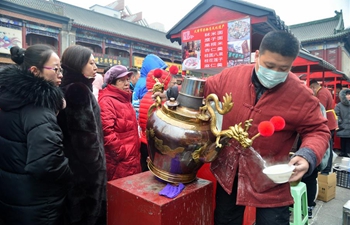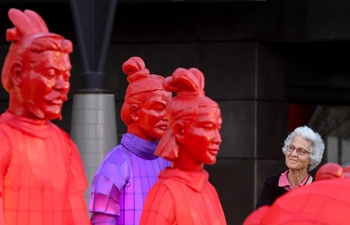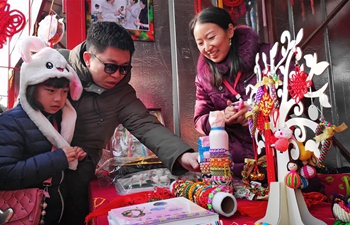by Xinhua writers Yao Yulin, Xie Ying, Xie Hao
CHANGSHA, Feb. 7 (Xinhua) -- Luo Pengfei, 22, is a good communicator with the elderly as it is his job to visit them every day to remodel their furniture.
"We visit the elderly to learn about their self-care ability, measure their bathroom area and threshold height, and check whether the floor will be slippery when getting wet," said Luo, who works for Kangle Nianhua, a company providing senior care services in central China's Hunan Province.
Luo will design the layout and then start home space reformation to clear hidden dangers, to give the elderly a safer home.
In rooms where the elderly are prone to falls, Luo's company will install handrails or grab bars and add non-slip stickers and pads. In the bathroom, the company will install a bathstool and a toilet chair.
The company also provides crutches for those with mobility problems.
Long Xinjian, 61, resident in the provincial capital of Changsha, has long suffered from high blood pressure and coronary heart disease. He had fallen in the toilet several times, but now with pads, wall handrails, removable toilet chairs and bath stools installed, he no longer worries when using the toilet.
"In the past, I could only walk while holding the wall, but now there are handrails on the wall and I can hold on to them tightly and walk more steadily," Long said.
EMPTY HOMES AND HELPLESS ELDERLY
By the end of 2017, China had more than 240 million people aged 60 or above, accounting for 17.3 percent of the total population, which means that one in four elderly people in the world was from China.
As of 2018, Changsha had an elderly population of around 1.4 million, among which empty nesters occupied about a half. More than 90 percent of the senior citizens rely on home-based elderly care, mostly living in old residential buildings built from the 1970s to 1990s.
Living alone has become the norm for the elderly, and great hidden troubles lurk behind the phenomenon.
"Generally speaking, elderly people are prone to difficulties in climbing steps and getting up after using the toilet, and to fall over the slippery ground or faint when they stand for a long time to take a shower. There are great safety hazards in their daily life," said Guo Hua, director of Changsha's office for population aging issues.
In early July 2018, Changsha implemented the "thousand households plan" to remodel home environment of the extremely-poor elderly free of charge. Funded by the Changsha Charity Association, each household furniture remodeling costs no more than 2,000 yuan (295 U.S. dollars).
In the following five years, the city plans to benefit 1,000 families.
"SAFETY BELT" IN HOME
In 2016, Beijing launched a house remodeling project to help the elderly families with financial difficulties. As of the end of 2017, 4,682 households enjoyed the project for free.
Non-slip mats, potable ramps, silica gel tableware, and nail clippers with a magnifying glass are included in the project. The edges and corners of the furniture also adopt silica gels to prevent the elderly from being scratched. Confined to bed, An Shiqin, 80, needs to be waited on in everything. Her daughter-in-law, Zhao Guomin, 47, has taken care of her for seven years in Beijing.
Last October, the family were provided with a nursing bed, side pillows, and specially designed tableware. "Because I am thin, it is very difficult for me to help the elderly up," said Zhao, "The new nursing bed can be rolled up and down, which helps me save effort."
Shi Lanzeng, 81, has lived alone in Beijing for years. His nephew, Shi Baoyu, 62, lives next door and said that when he is not at home, he worries that his uncle might get into some trouble.
"Now, with the remodeling done, I feel relieved when he is alone at home," Shi Baoyu said.
Senior citizens are generally satisfied with the project, and their self-care ability and life quality have been significantly improved, according to Yu Baijun with Bejing Laoxiao Xiaohai health technology company, which undertakes the project.
(Additional reporting by Tai Sicong)

















